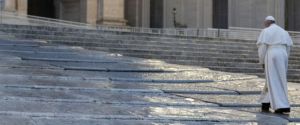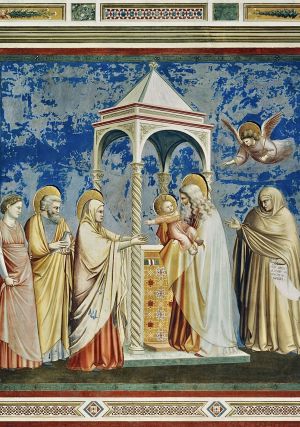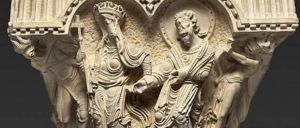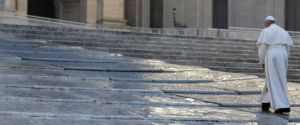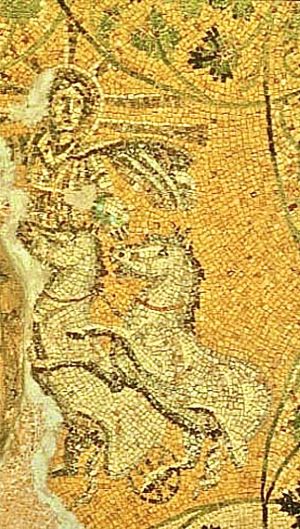
don Giuseppe Nespeca
Giuseppe Nespeca è architetto e sacerdote. Cultore della Sacra scrittura è autore della raccolta "Due Fuochi due Vie - Religione e Fede, Vangeli e Tao"; coautore del libro "Dialogo e Solstizio".
When People put down roots in the Land
Dear Brothers and Sisters,
The theme of God’s Law, of his commandments, makes its entrance in the Liturgy of the Word […] It is an essential element of the Jewish and Christian religions, where the complete fulfilment of the law is love (cf. Rom 13:10). God’s Law is his word which guides men and women on the journey through life, brings them out of the slavery of selfishness and leads them into the “land” of true freedom and life. This is why the Law is not perceived as a burden or an oppressive restriction in the Bible. Rather, it is seen as the Lord’s most precious gift, the testimony of his fatherly love, of his desire to be close to his People, to be its Ally and with it write a love story.
This is what the devout Israelite prays: “I will delight in your statutes, / I will not forget your word.... Lead me in the path of your commandments, / for I delight in it” (Ps 119[118]:16, 35). In the Old Testament the person who passes on the Law to the People on God’s behalf is Moses. After the long journey in the wilderness, on the threshold of the promised land, he proclaims: “Now, O Israel, give heed to the statutes and the ordinances which I teach you, and do them; that you may live, and go in and take possession of the land which the Lord, the God of your fathers, gives you” (Deut 4:1). And this is the problem: when the People put down roots in the land and are the depository of the Law, they are tempted to place their security and joy in something that is no longer the Word of God: in possessions, in power, in other ‘gods’ that in reality are useless, they are idols. Of course, the Law of God remains but it is no longer the most important thing, the rule of life; rather, it becomes a camouflage, a cover-up, while life follows other paths, other rules, interests that are often forms of egoism, both individual and collective.
Thus religion loses its authentic meaning, which is to live listening to God in order to do his will — that is the truth of our being — and thus we live well, in true freedom, and it is reduced to practising secondary customs which instead satisfy the human need to feel in God’s place. This is a serious threat to every religion which Jesus encountered in his time and which, unfortunately, is also to be found in Christianity. Jesus’ words against the scribes and Pharisees in today’s Gospel should therefore be food for thought for us as well.
Jesus makes his own the very words of the Prophet Isaiah: “This People honours me with their lips, but their heart is far from me; in vain do they worship me, teaching as doctrines the precepts of men” (Mk 7:6-7; cf. Is 29,13). And he then concludes: “You leave the commandment of God, and hold fast the tradition of men” (Mk 7:8).
The Apostle James too alerts us in his Letter to the danger of false piety. He writes to the Christians: “Be doers of the word, and not hearers only, deceiving yourselves” (Jas 1:22). May the Virgin Mary, to whom we now turn in prayer, help us to listen with an open and sincere heart to the word of God so that every day it may guide our thoughts, our decisions and our actions.
[Pope Benedict, Angelus 2 September 2012]
Christian roots of Europe
Distinguished Gentlemen!
On the occasion of these study days, dedicated to the "Common Christian Roots of the European Nations", you have wished for this audience, to meet with me.
As I extend my most heartfelt greetings to all of you personally, men of culture from Europe and the entire world who have come to Rome, I express my thanks to you, not only for this visit, which is so welcome to me, but also because you have chosen as the starting point and subject of your reflections ideas that I feel are intimately rooted in my spirit and which I have had the opportunity to express since the beginning of my pontificate (Speech of 22 October 1978) and then gradually, in the Homily in the Cathedral Square of Gniezno (3 June 1979), in the speech given in Czestochowa to the Polish Bishops (5 June 1979), during the visits to Subiaco, Montecassino, Norcia on the occasion of the 1550th anniversary of the birth of St Benedict, in the speech given at the UNESCO General Assembly (2 June 1980), and above all I manifested it openly and summarised it in the Apostolic Letter Egregiae virtutis (31 December 1980), with which I proclaimed Saints Cyril and Methodius patrons of Europe together with St Benedict.
Thank you for this sensitivity and attention to apostolic concerns, which characterise the life of the supreme Pastor of the Church who, in the name of Christ, also feels himself to be an affectionate and responsible Father of all humanity.
1. The cry that came spontaneously from my heart on that unforgettable day, on which for the first time in the history of the Church a Slav Pope, a son of the martyred and always glorious Poland, began his pontifical service, was nothing other than an echo of the yearning that drove St Cyril and Methodius to undertake their evangelising mission: "Open, open wide the doors to Christ! Do not be afraid to welcome Christ and accept his power ... To his saving power open the boundaries of states, economic systems as well as political ones, the vast fields of culture, civilisation, development. Do not be afraid. Allow Christ to speak to man. He alone has words of life.
You are familiar with the lives and events of the two saints: it is safe to say that their existence is presented in two essential aspects: an immense love for Christ and a threefold loyalty.
Their passionate and courageous love for Christ was manifested in their fidelity to the missionary and evangelising vocation, in their fidelity to the Roman See of the Pontiff and, finally, in their fidelity to the Slav peoples. They proclaimed truth, salvation, peace; they wanted peace! And so they respected the spiritual and cultural riches of each people, well convinced that the grace brought by Christ does not destroy, but uplifts and transforms nature. Because of this fidelity to the Gospel and to the local cultures, they invented a special alphabet to make it possible to transcribe the sacred books in the language of the Slav peoples, and so, against the recriminations of those who considered the three sacred languages, Hebrew, Greek and Latin, almost a dogma (the "Pilatians" as St Cyril called them), they introduced the Slav language also into the liturgy, with authoritative confirmation from the Pope, and as the first message they translated the "Prologue" of the Gospel of John. "Greeks by origin, Slavs by heart, canonically sent by Rome, they are a shining example of Christian universalism. Of that universalism which breaks down barriers, extinguishes hatreds and unites all in the love of Christ the Universal Redeemer" (Letter of the Cardinal Secretary of State to the faithful taking part in the celebrations of Saints Cyril and Methodius in Velehrad, Czechoslovakia) (cf. "L'Osservatore Romano", 6-7 July 1981).
2. The proclamation of the two holy apostles of the Slavs as patrons of Europe together with St Benedict was first of all intended to commemorate the eleventh centenary of the letter Industriae tuae, sent by Pope John VIII to Prince Svatopluk in June of the year 880, in which the use of the Slavonic language in the liturgy was praised and recommended, and the first centenary of the publication of the encyclical letter Grande munus (30 September 1880), in which Pope Leo XIII reminded the whole Church of the figures and apostolic activity of the two saints. But with it, in particular, I wanted to emphasise that 'Europe as a whole is, so to speak, the result of the action of two currents of Christian traditions, to which are also added two forms of culture that are different but at the same time profoundly complementary' (Leo XIII, Grande munus): Benedict embraces the predominantly Western and central European culture, which is more logical and rational, and spreads it through the various Benedictine centres in the other continents; Cyril and Methodius especially emphasise the ancient Greek culture and the more mystical and intuitive Eastern tradition.
This proclamation was meant to be a solemn recognition of their historical, cultural and religious merits in the evangelisation of the European peoples and in the creation of the spiritual unity of Europe.
You too, distinguished gentlemen, who have come from so many parts of the world, have paused to reflect on this undeniable phenomenon of ideal unity of the continent. The heads of the Lateran University of Rome and the Catholic University of Lublin have wished to draw here, to the Eternal City at the See of Peter, for four days of intense activity, more than two hundred intellectuals from twenty-three European and non-European nations, with a study scheme divided into twelve working groups with hundreds of papers. Two cultural institutions of international prestige invited thoughtful and responsible men to enter into a fraternal and constructive dialogue in the spirit and area of solicitude not only of the Catholic Church, but also of the world's supreme organisations. A line of absolute convergence was appropriately followed: the search for the Christian roots of the European peoples in order to offer an indication to the life of each individual citizen, and to give an overall and directional meaning to the history we are living, sometimes with alarming anguish.
In fact, we have a Europe of culture with the great philosophical, artistic and religious movements that distinguish it and make it the teacher of all the Continents; we have the Europe of work, which, through scientific and technological research, has developed in the various civilisations, up to the current era of industry and cybernetics; but there is also the Europe of the tragedies of peoples and nations, the Europe of blood, tears, struggles, ruptures, and the most appalling cruelties. Even on Europe, despite the message of the great spirits, the drama of sin, of evil, which, according to the evangelical parable, sows in the field of history the dreadful weeds, has made itself felt heavy and terrible. And today, the problem that besets us is precisely saving Europe and the world from further catastrophes!
3. Certainly, the Congress, in which you participate, has directly a scientific programme and value. But it is not enough to remain on an academic level. It is also necessary to search for the spiritual foundations of Europe and of each nation, to find a meeting platform between the various tensions and currents of thought, to avoid further tragedies, and above all to give man, the 'individual' walking along various paths towards the Father's House, the meaning and direction of his existence.
Here, then, is the message of Benedict, of Cyril and Methodius, of all the Christian mystics and saints, the message of the Gospel, which is light, life, truth, the salvation of man and peoples. Indeed, to whom should we turn to know the 'why' of life and history if not to God, who became man to reveal the saving Truth and to redeem man from the emptiness and abyss of useless and desperate anguish? "Christ the Redeemer," I wrote in the encyclical Redemptor Hominis, "fully reveals man to man himself. This is ... the human dimension of the mystery of the Redemption. In this dimension man rediscovers the greatness, dignity and values proper to his humanity ... The man who wants to understand himself to the full ... must, with his restlessness and uncertainty and even with his weakness and sinfulness, with his life and with his death approach Christ. He must, so to speak, enter into Him with his whole self..." (John Paul II, Redemptor Hominis, 28). Europe needs Christ! One must come into contact with Him, appropriate His message, His love, His life, His forgiveness, His eternal and exalting certainties! It must be understood that the Church that He wanted and founded has the sole purpose of transmitting and guaranteeing the Truth that He revealed, and keeping alive and current the means of salvation that He Himself instituted, namely the Sacraments and prayer. This was understood by chosen and thoughtful spirits such as Pascal, Newman, Rosmini, Soloviev and Norwid.
We find ourselves in a Europe in which the temptation of atheism and scepticism is becoming ever stronger; in which a painful moral uncertainty is taking root, with the disintegration of the family and the degeneration of customs; in which a dangerous conflict of ideas and movements dominates. The crisis of civilisation (Huizinga) and the waning of the West (Spengler) only signify the extreme topicality and necessity of Christ and the Gospel. The Christian sense of man, the image of God, according to the Greek theology so much loved by Cyril and Methodius and deepened by St Augustine, is the root of the peoples of Europe, and we must appeal to it with love and goodwill to give peace and serenity to our age: only in this way can we discover the human sense of history, which is in reality 'Salvation History'.
4. Distinguished and dear Gentlemen!
I like to conclude by recalling the last gesture and words of a great Slav, bound by a deep love for Europe, Fiodor Michailovic Dostoyevsky, who died one hundred years ago, on the evening of 28 January 1881 in St Petersburg. A great lover of Christ, he had written: "...science alone will never complete every human ideal and peace for mankind; the source of life and salvation from despair for all men, the sine qua non and the guarantee for the entire universe are enclosed in the words: The Word became flesh and faith in these words (F. Dostoyevsky, The Demons, Sansoni, Florence, 1958). Before he died, he had the Gospel that had accompanied him during the painful years of his imprisonment in Siberia brought to him and read to his children.
Europe needs Christ and the Gospel, because here lie the roots of all its peoples. be ye also heedful of this message!
May my blessing accompany you, which I impart to you with great effusion in the name of the Lord!
[Pope John Paul II, Speech 6 November 1981]
Two identity cards
To know our true identity, we cannot be "sitting Christians" but must have the "courage to always set out to seek the face of the Lord", because we are "the image of God". In the Mass celebrated at Santa Marta on Tuesday, 10 February, Pope Francis, commenting on the first liturgical reading - the account of creation in the book of Genesis (1:20 - 2:4) - reflected on an essential question for every person: "Who am I?".
Our 'identity card', said the Pope, is found in the fact that human beings were created 'in the image, according to the likeness of God'. But then, he added, "the question we can ask ourselves is: How do I know the image of God? How do I know what he is like in order to know what I am like? Where do I find the image of God?" The answer is to be found "certainly not on the computer, not in encyclopaedias, not in books", because "there is no catalogue where the image of God is". There is only one way "to find the image of God, which is my identity" and that is to set out: "If we do not set out, we will never know the face of God".
This desire for knowledge is also found in the Old Testament. The psalmists, Francis noted, "many times say: I want to know your face"; and "even Moses once said this to the Lord". But in reality "it is not easy, because setting out means leaving behind so many certainties, so many opinions of what the image of God is like, and seeking him". It means, in other words, "letting God, life, put us to the test", it means "risking", because "only in this way can one come to know the face of God, the image of God: by setting out".
The Pope drew again on the Old Testament to recall that "this is what God's people did, this is what the prophets did". For example "the great Elijah: after having conquered and purified the faith of Israel, he feels the threat of that queen and is afraid and does not know what to do. He sets out. And at a certain point, he prefers to die". But God "calls him, gives him food and drink and says: keep walking". So Elijah "arrives at the mountain and there he finds God". His was therefore 'a long journey, a painful journey, a difficult journey', but it teaches us that 'whoever does not set out, will never know the image of God, will never find the face of God'. It is a lesson for all of us: 'the seated Christians, the quiet Christians,' said the Pontiff, 'will not know the face of God. They have the presumption to say: 'God is like this, like that...', but in reality they 'do not know him'.
To walk, on the other hand, 'you need that restlessness that God himself has placed in our hearts and that leads you forward to seek him'. The same thing, the Pontiff explained, happened "to Job who, with his trial, began to think: but how is God, who allows this to me?". Even his friends 'after a great silence of days, began to talk, to discuss with him'. But all this was not helpful: 'with these arguments, Job did not know God'. Instead, 'when he allowed himself to be challenged by the Lord in the trial, he met God'. And it is precisely from Job that we can hear "that word that will help us so much in this journey of searching for our identity: 'I knew you by hearsay, but now my eyes have seen you'". This is the heart of the matter according to Francis: "the encounter with God" that can happen "only by setting out".
Certainly, he continued, "Job set out with a curse", even "he had the courage to curse life and his history: 'Cursed is the day I was born...'". Indeed, the Pope reflected, 'sometimes, in the journey of life, we do not find meaning in things'. The same experience was had by the prophet Jeremiah, who "after being seduced by the Lord, he heard that curse: 'But why me?'". He wanted to "sit quietly" and instead "the Lord wanted to make him see his face".
This is true for each of us: "to know our identity, to know the image of God, we must set out", be "restless, not quiet". Precisely this "is to seek the face of God".
Pope Francis then also referred to the passage in Mark's Gospel (7:1-13), in which "Jesus encounters people who are afraid to set out" and who build a sort of "caricature of God". But that "is a false identity card" because, the Pontiff explained, "these non-restless ones have silenced the restlessness of the heart: they paint God with the commandments" but in so doing "they forget God" in order to observe only "the tradition of men". And "when they are unsure, they invent or make another commandment". Jesus says to the scribes and Pharisees who heap up commandments: "So you nullify the Word of God with the tradition you have handed down, and of such things you do many. Precisely this 'is the false identity card, the one we can have without setting out, quiet, without the restlessness of the heart'.
In this regard, the Pope highlighted a "curious" detail: the Lord in fact "praises them but rebukes them where the sore point is. He praises them: 'You are truly skilful in rejecting God's commandment in order to observe your tradition'", but then "he rebukes them where the strongest point of the commandments is with your neighbour". In fact, Jesus recalls that Moses said, "Honour your father and your mother, and whoever curses father or mother shall be put to death". He continues: "You, on the other hand, say: if one declares to one's father or mother that "what I should help you with, that is, give you food, give you clothing, give you to buy medicine, is Korbàn, an offering to God", do not allow them to do anything more for their father and mother". In doing so "they wash their hands of the tenderest, strongest commandment, the only one that has a promise of blessing". And so "they are quiet, they are quiet, they do not set out". This then "is the image of God that they have". In reality theirs is a path 'in quotes': that is, 'a path that does not walk, a quiet path. They deny their parents, but they fulfil the laws of tradition that they have made'.
Concluding his reflection, the bishop of Rome reproposed the meaning of the two liturgical texts as 'two identity cards'. The first is 'the one we all have, because the Lord has made us that way', and it is 'the one that tells us: set out and you will know your identity, because you are the image of God, you are made in God's likeness. Set out and seek God". The other instead reassures us: 'No, rest assured: fulfil all these commandments and this is God. This is the face of God'. Hence the wish that the Lord "give us all the grace of the courage to always set out, to seek the face of the Lord, that face that one day we will see but which here, on earth, we must seek."
[Pope Francis, St. Martha, in L'Osservatore Romano 11/02/2015]
Presentation of Jesus at the Temple
Presentation of Jesus at the Temple [2 February 2026]
May God bless us and may the Virgin protect us! Here is also a brief commentary on the texts of the liturgy for the feast of the Presentation of Jesus at the Temple.
*First Reading from the Book of the Prophet Malachi (3:1-4)
Malachi's text was written in a context of crisis: there was no longer a Davidic king, the people were subjugated by the Persians, and authority was in the hands of the priests. For this reason, the prophet insists on the covenant with the Levites, recalling its divine origin and denouncing its present corruption. The central announcement is the imminent coming of the Lord to his temple, also called the Angel of the Covenant: not a simple messenger, but God himself who comes to re-establish the Covenant. This coming is both desired and feared, because it is a coming of judgement that purifies: it does not destroy man, but eliminates the evil that is in him. Before this coming, God sends a messenger who prepares the way by calling for conversion. The New Testament will recognise John the Baptist as this precursor and Jesus himself as the Angel of the Covenant announced by Malachi. The message remains relevant today: God enters his temple to renew the Covenant, purify worship and lead his people back to fidelity of heart.
*Responsorial Psalm (23/24, 7, 8, 9, 10)
The poetic expression "Lift up your heads, O gates" (v. 9) is a hyperbole that celebrates the majesty of the "King of Glory," that is, God himself, who solemnly enters the Temple of Jerusalem. The gates do not simply open: they are lifted up, as if the building itself had to become larger to accommodate the divine presence. The psalm refers to the solemn dedication of the first Temple by Solomon (around 950 BC), when the Ark of the Covenant was carried in procession to the Holy City, accompanied by singing, music and sacrifices. The Ark, placed in the Holy of Holies under the wings of the cherubim, represented the invisible throne of God in the midst of his people. The cherubim, far from the imagery of little angels, were majestic and symbolic figures, a sign of divine sovereignty. The psalm seems to be structured as a liturgical dialogue between two choirs: one invites the gates to open, the other proclaims the identity of the king of glory as the strong and victorious Lord. The warrior titles remind us that God accompanied Israel in its struggles for freedom and survival: the Ark was the sign of his presence in the people's battles. Even after the disappearance of the Ark, especially after the Babylonian Exile, this psalm continued to be sung in the Temple. It was precisely the absence of the Ark that increased its spiritual value: Israel learned that God's presence is not tied to an object, however sacred and laden with memory. Over the centuries, the psalm took on a messianic meaning: the invocation 'let the King of glory enter' became an expression of the expectation of the Messiah, the definitive king who would defeat evil and inaugurate a renewed humanity. The 'Lord of hosts' came to be understood progressively as the God of the universe, no longer just the God of Israel but the Lord of all humanity. This is why the Christian liturgy sings this psalm on the feast of the Presentation of Jesus in the Temple: it is a profession of faith that recognises in that child the true king of glory, God himself who enters his Temple and comes to meet his people.
*Second Reading from the Letter to the Hebrews (2:14-18)
The Letter to the Hebrews was written in a climate of controversy: Christians of Jewish origin were accused of following a Messiah who could not be a priest according to the Law. The author responds by showing that Jesus fulfils the priesthood in a new and definitive way. Although he does not belong to the tribe of Levi, Jesus is a priest according to the order of Melchizedek, that is, in a more ancient and universal form. He does not reproduce the priesthood of the Old Testament, but brings it to fulfilment, realising its profound purpose. Jesus is a true priest because: he is fully in solidarity with humanity, sharing its weakness, suffering and death; he is in full communion with God, as his resurrection demonstrates; he re-establishes the Covenant, freeing humanity from fear and the slavery of death. Salvation is offered to all, but it concerns in particular the 'children of Abraham', that is, those who live in faith as trust. The Covenant is a free gift from God, but it requires a free response: to accept or reject it remains the responsibility of man.
*From the Gospel according to Saint Luke (2:22-40)
The account of the Presentation of Jesus in the Temple is constructed with great care and highlights two fundamental elements: the Law and the Spirit. In the first verses, Luke repeatedly emphasises the Law of Israel, not as a simple set of prescriptions, but as an expression of the faith and expectation of the people. Jesus' life begins within the faith of Israel: Mary and Joseph devoutly perform the prescribed gestures, placing the child within the history and hope of their people. Luke's first message is clear: the salvation of humanity is born within the Law of Israel. It is in this context that the Word of God became incarnate and that God's plan of love for humanity took shape. Immediately afterwards, Simeon enters the scene, guided by the Holy Spirit, who is also mentioned several times. It is the Spirit who reveals the identity of the child to him: Jesus is the Saviour prepared by God before all peoples. Simeon's words summarise the entire Old Testament as a long preparation for the fulfilment of salvation, which concerns not only Israel but all humanity. Israel is the 'glory' because it has been chosen as the instrument of universal salvation. The event takes place in the Temple of Jerusalem, a decisive place for Luke: here Malachi's prophecy about the Lord's sudden entry into his Temple is fulfilled. Jesus is recognised as the Angel of the Covenant, the Lord himself who comes to visit his people. The images of light and glory used by Simeon fit perfectly into this perspective. The story also recalls the Psalm of the 'king of glory': the long-awaited royal Messiah enters the Temple, not with outward power, but in the poverty of a newborn baby. Nevertheless, the scene is solemn and full of glory, because in that child is present all the expectation of Israel, represented by Simeon and Anna, figures of faithful hope. Simeon's canticle affirms that Jesus is the Messiah and the glory of God: with him, divine glory enters the Sanctuary. This means that Jesus not only brings the glory of God, but is the glory of God, is God himself present among his people. With his coming, the time of the Law reaches its fulfilment: the Angel of the Covenant has entered the Temple to give the Spirit, enlighten the nations and inaugurate the new time of universal salvation.
+Giovanni D'Ercole
We, the fringe of his cloak
Bread and prodigies of the Christ-ghost
(Mk 6:53-56)
A saved existence requires a transformation from within; another beginning. A different foothold of good.
In fact, the «fringe of the mantle» is its People - and each of us, when we are enabled to perceive and prolong his appeal, his spirit, care, action.
A «touching» that is not mere gesture: it calls total involvement; personal Faith, a digging in.
The crowds around the Lord and the Church, his primary presence, seek bread and healing... but sometimes they forget the adhesion to the inner Person who gives and cares.
Yet even in these cases the infallible Guide re-proposes its uninterrupted vital wave - with therapies that do not impose themselves by passing through souls as a bolt of lightning would, but in actual existence.
God frees, saves, creates, starting from tensions and defects (including religious ones) because He wants to bring us to awareness.
The Father wishes to make us penetrate the value of the act of love that makes the weak strong; each embodied gesture that re-creates, open to any sense of emptiness.
Nuisances do not happen out of bad luck or punishment: they come to let us flourish again, just beginning from the pains of the soul.
If they persist, no fear: they become more explicit messages, from our own higher Seed.
It means that in our orchestra something is out of tune or overlooked, and must fade or be discovered and put into play.
The symptoms of restlessness also belong to the innate quintessence - which always has power of topicality.
The keystone will therefore not be the look, nor the health, but the very acceptance of the bitterness, of the hardships, which come to clear out the unessential - and release trapped spiritual impulses.
Perhaps not a few would prefer to wait for a miraculous landing of the Master [typified healer] that brings immediate benefit and favours.
Exterior salvation with a magical flavour - transient, although physically palpable.
Total and sacred redemption - truly messianic - is not resounding. It’s accomplished only step by step; thus it remains profound and radical.
Capable of new beginnings, and birth acts of still embryonic energy, precisely starting from the individual precariousness.
We proclaim in words and deeds the authentic Face of the Son, precisely to annihilate the idea of the Christ-phantom of the previous passage (v.49), an evanescent, merely apologetic figure.
His intimates’ People - a presence no longer ineffable and mysterious - works in proximity, because being healed does not mean escaping transience.
A saved existence requires a transformation from within; another beginning. A different foothold and grasp of the good.
Elsewhere from the civilisation of appearance is the ‘improvement’ of our condition and security, from insecurity.
Leapfrogging is not in a simple getting back on our feet; indiscreet and passing ‘gain’.
Phenomenal, but only punctual and inconclusive, or that finally abdicates.
[Monday 5th wk. in O.T. February 9, 2026]
We, the fringe of his cloak
Bread and wonders of the Christ-phantom
(Mk 6:53-56)
"He can carry the cloak of the Master who is devoted to the cause of non-violence and non-possession, who is driven by the pursuit of truth and right view, who is able to solve his own emotional and intellectual problems and can show others the way to overcome their emotional and intellectual problems" [Acharya Mahaprajna].
While some are continually crowding around Jesus and preventing others from having a personal relationship with Him, something has to be made up; at least take Him in stride (v.56).
"And wherever he entered villages or towns or hamlets they placed the sick in the squares and begged him to touch even the fringe of his cloak. And as many as touched him were saved'.
Indeed, the fringe of his cloak is his People - and each one of us, when by Gift we are enabled to perceive and prolong his call, spirit, care, action.
A 'touching' that is not mere gesture: it calls for total involvement; personal faith, digging in.
The crowds around the Lord and the Church, his primary presence, seek bread and healing... but sometimes forget adherence to the inner Person who gives and heals.
Yet even in these cases the infallible Guide re-proposes his unbroken wave of life - with therapies that do not impose themselves by passing through souls as lightning would, but in real existence.
God liberates, saves, creates, from tensions and faults (even religious ones) because he wants to bring us to awareness.
The Father desires to make us penetrate the value of the act of love that makes the weak strong; every re-creating gesture, embodied, open to any sense of emptiness.
Annoyances do not happen out of misfortune or chastisement: they come to let us flourish again, precisely out of the pains of the soul.
If they persist, no fear: they become more explicit messages, from our own Higher Seed.
It means that in our orchestra something is out of tune or neglected, and must either fade away or be discovered and brought into play.
Otherwise, we will not be able to grow towards the destiny that characterises a Calling and every discomfort.
The symptoms of unease also belong to the innate quintessence - which always has topical power.
The key will therefore not be looks, nor health, but the very acceptance of bitterness, of hardships, which come to clear away the inessential - and release trapped spiritual drives.
Energies of imbalance, which, however, want to be transformed into the ability to cast ballast; as well as to better accommodate and integrate the vocation into one's own history, in order to build life again.
Perhaps not a few would prefer to wait for a miraculous landing of the Master [typified healer] that brings immediate benefit, immediate favour.
Outward salvation with a magical flavour - transient, even if physically palpable or even in ethical semblance.
A phenomenal but simplistic Lord.
An Appearance that dies immediately, then we start again - if He (in us, in our turning points) did not involve the same uncertainties that mark us.
And the long time of trials, which gradually take on a more intimate weight.
Total and sacred - truly messianic - redemption is little prone to epidermal clamour.
Healing is not scenic. It is only realised step by step; thus it remains profound and radical.
It becomes capable of new beginnings and acts of birth of still embryonic energy, precisely from individual precariousness.
Its People of intimates - a presence that is no longer ineffable and mysterious - works in proximity, to erase the false image of the philosophical or forensic God, always external.
A sovereign or imperative engine, distant and absent - touchy, predatory - that occasionally takes aim; it does not overcome, nor does it reconfirm. Never looking at our present.
Thus the Church rejects the idea of the ratifying Eternal, but also that of the mass thaumaturge, immediately resolving - so dear to the miracle merchants.
A figure that easily takes hold of our fantasies.
We announce his authentic Face with words and gestures, precisely to annihilate the idea of the Christ-phantom of the previous passage (v.49), a deplorable and absurd figure.
An evanescent icon, merely apologetic, which unfortunately in history has given ample space to business associates with the Most High.
As such, being healed does not mean escaping transience.
A saved existence requires a transformation from within; a different beginning. A different grasp of good.
Jesus traverses our environments as a silent traveller, and also accepts a primitive faith.
But albeit with quiet power, the divine impulse works in every seeker of meaning and every needy person.
It establishes itself there personally, precisely from interrupted dreams.
The Lord cannot be imprisoned and contained: he draws near, to initiate great cleansing, shift our gaze, and renew the stale universe.
Thus he transforms our souls, in the experience of his free communion,
communion that wants to take up residence in us, to merge and dilate the drive to life - perhaps cowering in abstention. For each one to be amazed at himself, at unknown passions, at new relationships.
Believer and community manifest in empathic forms the incisive healing power of Faith in the Risen One, starting from one's own intimate story.
We experience him alive in the monotonous, unrewarding and precarious day-to-day - nevertheless capable of changing the order of existence hidden in sketchy quarters [v.56: "hamlets"] and its unexpressed destination.
Without disturbing with special, one-sided, or pressing effects.
The Tao Tê Ching (xi) writes: "Thirty races unite in one hub, and in its non-being is the usefulness of the chariot".
Elsewhere from the civilisation of appearance is the 'improvement' of our condition and security, from insecurity.
Not in a simple getting back on our feet; indiscreet and transient 'gain'.
Phenomenal, but only punctual and inconclusive, or finally abdicating.
To internalise and live the message:
How do you consider Jesus? Miracle-worker or recoverer?
How do you deal with those who are excluded or seem to be without a shepherd?
Being saved
Being saved does not mean merely escaping punishment but being delivered from the evil that dwells within us. It is not punishment that must be eliminated but sin, the rejection of God and of love which already bears the punishment in itself.
The Prophet Jeremiah was to say to the rebellious people: “Your wickedness will chasten you, and your apostasy will reprove you. Know and see that it is evil and bitter for you to forsake the Lord your God” (Jer 2:19).
It is from this sorrow and bitterness that the Lord wishes to save man, liberating him from sin. Therefore, however, a transformation from within is necessary, some foothold of of goodness, a beginning from which to start out in order to change evil into good, hatred into love, revenge into forgiveness..
[Pope Benedict, General Audience 18 May 2011]
Declining missionary drive: crisis of Faith
2. The Council has already borne much fruit in the realm of missionary activity. There has been an increase of local churches with their own bishops, clergy and workers in the apostolate. The presence of Christian communities is more evident in the life of nations, and communion between the churches has led to a lively exchange of spiritual benefits and gifts. The commitment of the laity to the work of evangelization is changing ecclesial life, while particular churches are more willing to meet with the members of other Christian churches and other religions, and to enter into dialogue and cooperation with them. Above all, there is a new awareness that missionary activity is a matter for all Christians, for all dioceses and parishes, Church institutions and associations.
Nevertheless, in this "new springtime" of Christianity there is an undeniable negative tendency, and the present document is meant to help overcome it. Missionary activity specifically directed "to the nations" (ad gentes) appears to be waning, and this tendency is certainly not in line with the directives of the Council and of subsequent statements of the Magisterium. Difficulties both internal and external have weakened the Church's missionary thrust toward non-Christians, a fact which must arouse concern among all who believe in Christ. For in the Church's history, missionary drive has always been a sign of vitality, just as its lessening is a sign of a crisis of faith.
[Pope John Paul II, Redemptoris Missio]
Other Creation
God is always at work out of love and it is up to us to respond to him with responsibility and in a spirit of reconciliation, leaving room for the Holy Spirit. This was the invitation addressed by the Pope in the Mass celebrated Monday morning, 9 February, in the chapel of the Casa Santa Marta.
"Today's liturgy of the Word," Francis explained immediately, referring to the passage from Genesis (1:1-19), "leads us to think, to meditate on God's workings: God works". So much so that "Jesus himself said: 'My Father still works, still acts, still works; me too!". And so, the Pope recalled, "some medieval theologians explained: first God, the Creator, creates the universe, creates the heavens, the earth, the living. He creates. The work of creation'. However, 'creation does not end: He continually sustains what He has created, He works to sustain what He has created so that it goes on'.
Precisely in Mark's Gospel (6:53-56), the Pope noted, "we see God's 'other creation'" that is, "that of Jesus who comes to 're-create' what had been ruined by sin". And "we see Jesus among the people". In fact, Mark writes: "When he got out of the boat, the people immediately recognised him and flocked from all over the region and began to bring the sick to him on stretchers, wherever they heard he was; and those who touched him were saved". It is "the 're-creation'", precisely, and "the liturgy expresses the soul of the Church in this, when it makes us say in a beautiful prayer: 'Oh God, who so marvellously created the universe, but more marvellously recreated it in redemption'". So 'this "second creation" is more wonderful than the first, this second work is more wonderful'.
There is then, Francis continued, "another work: the work of perseverance in the faith, which Jesus says is done by the Holy Spirit: 'I will send you the Paraclete and He will teach you and make you remember what I have said'". It is "the work of the Spirit within us, to make Jesus' word alive, to preserve creation, to ensure that this creation does not fail". So "the presence of the Spirit there, making the first creation and the second creation alive".
In short, 'God works, continues to work, and we can ask ourselves how we are to respond to this creation of God, which was born out of love because He works out of love'. Thus "to the 'first creation' we must respond with the responsibility that the Lord gives us: 'The earth is yours, bring it forth; make it grow!'". Therefore "for us too there is the responsibility to make the earth grow, to make creation grow, to guard it and make it grow according to its laws: we are lords of creation, not masters". And we must not 'take possession of creation, but make it grow, faithful to its laws'. Precisely "this is the first response to God's work: to work to care for creation, to make it bear fruit".
In this perspective, the Pope argued, 'when we hear that people hold meetings to think about how to guard creation, we can say: "But no, it's the greens!"'. Instead, he relaunched, "it is not the greens: this is Christian!". And "it is our response to God's 'first creation', it is our responsibility!". In fact, "a Christian who does not care for creation, who does not make it grow, is a Christian who does not care for God's work, that work born of God's love for us". And "this is the first response to the first creation: to guard creation, to make it grow".
But "to the 'second creation', how do we respond?" asked Francis, noting that, in this regard, "the Apostle Paul tells us a right word, which is the true response: 'Let yourselves be reconciled with God'". It is, he explained, 'that open interior attitude to go continuously on the road of interior reconciliation, of communal reconciliation, because reconciliation is the work of Christ'. And Paul goes on to say: 'God has reconciled the world in Christ'. And "this is the second answer". So "to the 'second creation' we say: 'Yes, we must allow ourselves to be reconciled with the Lord'".
Francis then proposed another question: "And to the work that the Holy Spirit does in us, of reminding us of Jesus' words, of explaining to us, of making us understand what Jesus said, how do we respond?" It was "Paul who told us" not to grieve "the Holy Spirit who is in you: be careful, he is your host, he is within you, he is working within you! Do not grieve the Holy Spirit". And this "because we believe in a personal God. God is person: he is person Father, person Son and person Holy Spirit'. Moreover, "all three are involved in this creation, in this recreation, in this perseverance in re-creation". So "to all three we respond: to guard and make creation grow, let us be reconciled with Jesus, with God in Jesus, in Christ, every day, and do not grieve the Holy Spirit, do not chase him away: he is the guest of our heart, the one who accompanies us, who makes us grow".
In conclusion, the Pope prayed that "the Lord will give us the grace to understand that He is at work; and give us the grace to respond rightly to this work of love."
[Pope Francis, St. Martha, in L'Osservatore Romano 10/02/2015]
Salt and Light in Vocation
(Mt 5:13-16)
«Beautiful Works» [which express fullness] are good works, enriched by the splendour of disinterest, listening, hospitality, prayer and humble dialogue, cordial fraternity.
The plural term (v.16) indicates our vocation to reinterpret in a personal way the Self-Portrait of Christ imprinted in the Beatitudes just proclaimed (vv.1-12).
We each have an irreplaceable role in the moments of equilibrium break and Exodus.
We are legitimized unconditionally.
God has respect for the shortcomings and the functions that are lacking: who knows what blissful novelties they hide and are preparing.
The Beatitudes have their own fragrance, but all personal. Their «salt» fights the insignificant of fatuous hopes.
And sons look far away, but they are with the "pasta"... remaining a living call: between God and man [who is himself even in fraternity] there is an inviolable bond.
In fact, «Light» is what doesn’t mix with things, but distinguishes them.
The Israelites considered themselves «Light of the world» for their devotion and impeccable religious practice.
For Jesus, the faithful and the Community are «Light» because they walk in the friendly glory of the Master.
The disciple and the Assembly are «Salt» because they appear in the world under any circumstance as those who give it meaning, Wisdom [from the Latin «sapĕre», to have flavour].
We are called to be a sign of a new Pact, because the unexpected Relation of the Mount that the Son proposes could no longer be contained in the First Covenant.
To the ancient needs of purification Christ replaces those of full fraternity, which in the enhancement of each person gives taste and (precisely) flavor, and becomes a lamp to our steps.
This "second Pact" doesn’t crush the believing people. Sign of a Father who recovers and infuses orientations to the individual path and to the Churches - not from the outside, but from our roots and as a leaven.
We become a living Beauty thanks to an activity that is imperfect but that has its influence on flowering, from within.
Thus preserving people from the unraveling of dehumanization and corruption - like «salt» with food.
«Salt and Light» are every little divine element that has its own Mystery and Appeal.
Our little candles can continue to thin out the darkness, but only until we put them under a «bushel» (v.15), that is, under a pedissee «measure» - wich is not the different, propulsive and always unprecedent one of the Beatitudes.
In Christ we are led to an evolutionary leap: we are Sapidity though minute of things, and limited Lights, yes - but not inhibited.
The life of Faith guides and stimulates the building of a realm of personal Taste and Love, without hysteria or intimate dissociations.
This adventure is configured as a New Alliance between soul, reality, global and local world, signs of time and Mystery.
Light of Freedom that coincides with our Vocation by Name. Intelligent energy that knows how to draw alternative life even from the wounds inflicted.
[5th Sunday in O.T. (year A) February 8, 2026]
Brothers and sisters, a frequent flaw of those in authority, whether civil or ecclesiastic authority, is that of demanding of others things — even righteous things — that they do not, however, put into practise in the first person. They live a double life. Jesus says: “They bind heavy burdens, hard to bear, and lay them on men’s shoulders; but they themselves will not move them with their finger (v.4). This attitude sets a bad example of authority, which should instead derive its primary strength precisely from setting a good example. Authority arises from a good example, so as to help others to practise what is right and proper, sustaining them in the trials that they meet on the right path. Authority is a help, but if it is wrongly exercised, it becomes oppressive; it does not allow people to grow, and creates a climate of distrust and hostility, and also leads to corruption (Pope Francis)
Fratelli e sorelle, un difetto frequente in quanti hanno un’autorità, sia autorità civile sia ecclesiastica, è quello di esigere dagli altri cose, anche giuste, che però loro non mettono in pratica in prima persona. Fanno la doppia vita. Dice Gesù: «Legano infatti fardelli pesanti e difficili da portare e li pongono sulle spalle della gente, ma essi non vogliono muoverli neppure con un dito» (v.4). Questo atteggiamento è un cattivo esercizio dell’autorità, che invece dovrebbe avere la sua prima forza proprio dal buon esempio. L’autorità nasce dal buon esempio, per aiutare gli altri a praticare ciò che è giusto e doveroso, sostenendoli nelle prove che si incontrano sulla via del bene. L’autorità è un aiuto, ma se viene esercitata male, diventa oppressiva, non lascia crescere le persone e crea un clima di sfiducia e di ostilità, e porta anche alla corruzione (Papa Francesco)
This is the road Jesus points out to all who want to be his disciples: "Judge not... condemn not... forgive, and you will be forgiven; give, and it will be given to you.... Be merciful, even as your Father is merciful" (Lk 6: 36-38). In these words we find very practical instructions for our daily conduct as believers [Pope Benedict]
Questa è la strada che Gesù mostra a quanti vogliono essere suoi discepoli: "Non giudicate... non condannate... perdonate e vi sarà perdonato; date e vi sarà dato... Siate misericordiosi come è misericordioso il Padre vostro" (Lc 6, 36-38). In queste parole troviamo indicazioni assai concrete per il nostro quotidiano comportamento di credenti [Papa Benedetto]
Path of Lent, learning a little more how to “ascend” with prayer and listen to Jesus and to “descend” with brotherly love, proclaiming Jesus (Pope Francis)
Itinerario della Quaresima, imparando un po’ di più a “salire” con la preghiera e ascoltare Gesù e a “scendere” con la carità fraterna, annunciando Gesù (Papa Francesco)
Anyone who welcomes the Lord into his life and loves him with all his heart is capable of a new beginning. He succeeds in doing God’s will: to bring about a new form of existence enlivened by love and destined for eternity (Pope Benedict)
Chi accoglie il Signore nella propria vita e lo ama con tutto il cuore è capace di un nuovo inizio. Riesce a compiere la volontà di Dio: realizzare una nuova forma di esistenza animata dall’amore e destinata all’eternità (Papa Benedetto)
You ought not, however, to be satisfied merely with knocking and seeking: to understand the things of God, what is absolutely necessary is oratio. For this reason, the Saviour told us not only: ‘Seek and you will find’, and ‘Knock and it shall be opened to you’, but also added, ‘Ask and you shall receive’ [Verbum Domini n.86; cit. Origen, Letter to Gregory]
duevie.art
don Giuseppe Nespeca
Tel. 333-1329741
Disclaimer
Questo blog non rappresenta una testata giornalistica in quanto viene aggiornato senza alcuna periodicità. Non può pertanto considerarsi un prodotto editoriale ai sensi della legge N°62 del 07/03/2001.
Le immagini sono tratte da internet, ma se il loro uso violasse diritti d'autore, lo si comunichi all'autore del blog che provvederà alla loro pronta rimozione.
L'autore dichiara di non essere responsabile dei commenti lasciati nei post. Eventuali commenti dei lettori, lesivi dell'immagine o dell'onorabilità di persone terze, il cui contenuto fosse ritenuto non idoneo alla pubblicazione verranno insindacabilmente rimossi.




